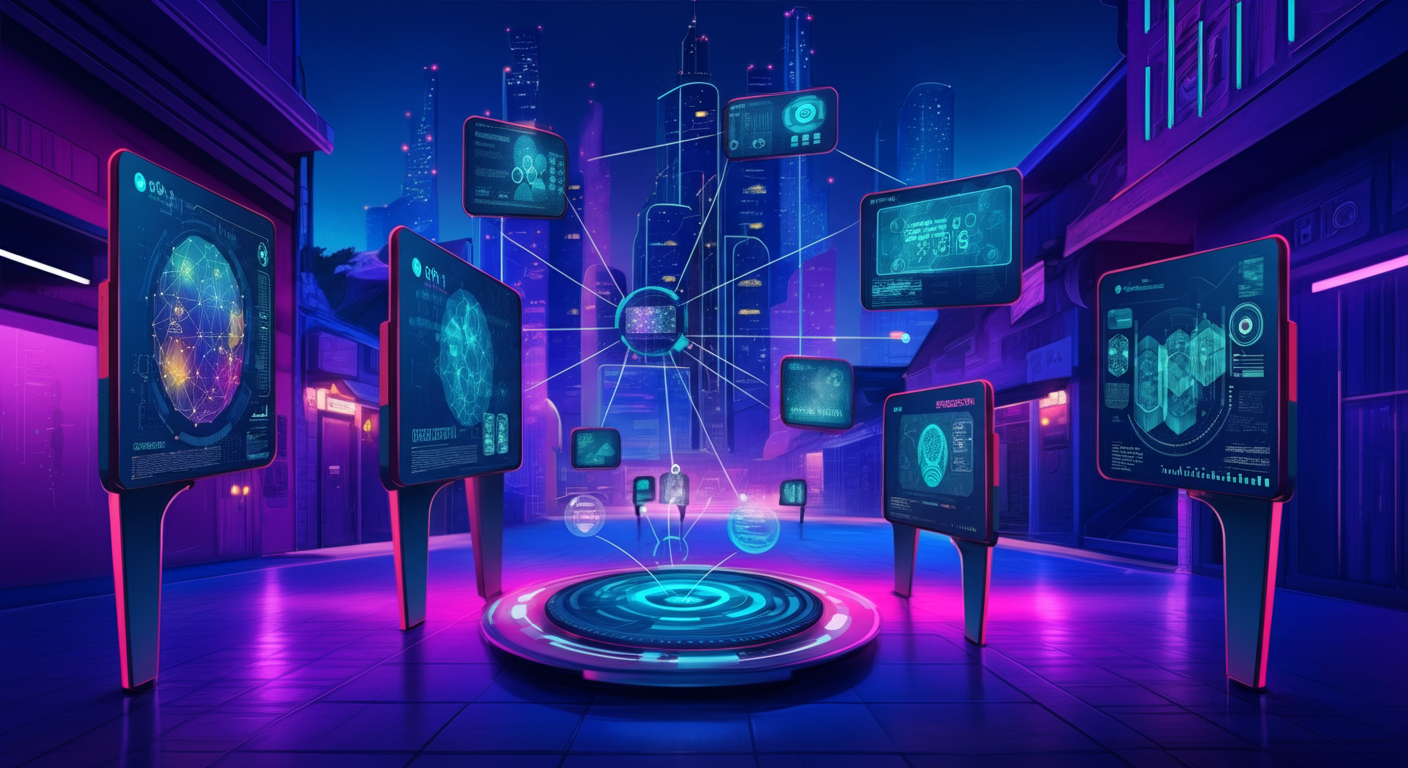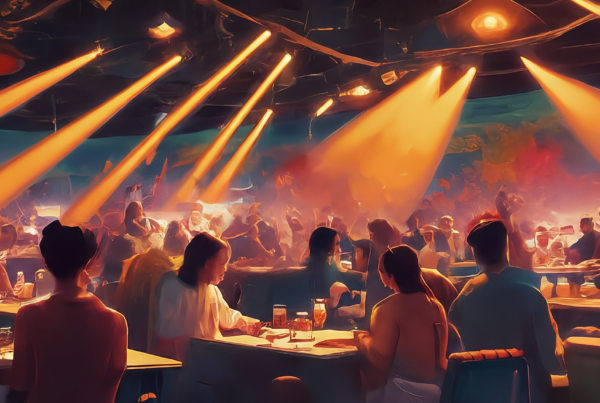In today’s fast-paced world, staying ahead of the curve in commercial entertainment is more crucial than ever. Businesses in the hospitality and entertainment industries are constantly seeking innovative solutions to captivate their audiences and enhance the customer experience. Whether you’re managing a bustling casino, a lively restaurant, or a cozy bar, the latest trends in entertainment technology can significantly impact your business’s success.
Imagine walking into a venue where the atmosphere is alive with vibrant digital displays, interactive experiences, and seamless connectivity. This isn’t just the future; it’s the present of commercial video programming. These innovations are transforming how businesses engage with their customers, providing immersive experiences that keep patrons coming back for more.
At the heart of these advancements is the drive to create personalized and engaging environments. From digital signage solutions to cutting-edge hospitality TV packages, the possibilities are endless. Businesses are now leveraging technology to deliver content that resonates with their audience, ensuring a memorable visit every time.
As we delve into the latest innovations in commercial entertainment, we’ll explore how businesses can harness these tools to stay competitive. From understanding the importance of curated entertainment experiences to choosing the right provider for your needs, this blog will guide you through the ever-evolving landscape of commercial entertainment. Continue reading to discover how you can enhance your customer experience and create an engaging atmosphere that sets your business apart.
Emerging Technologies Transforming Commercial Entertainment
The landscape of commercial entertainment is undergoing a significant transformation, driven by the integration of cutting-edge technologies such as Artificial Intelligence (AI), Augmented Reality (AR), and the Internet of Things (IoT). These innovations are not only enhancing guest experiences but also streamlining operations within the industry. Businesses in the hospitality and entertainment sectors are leveraging these technologies to stay competitive and deliver exceptional customer experiences.
AI is revolutionizing the way businesses interact with their guests. By utilizing AI-driven analytics, companies can offer personalized experiences tailored to individual preferences. For instance, AI can analyze customer data to recommend entertainment options that align with their interests, thereby increasing engagement and satisfaction. According to a report by StartUs Insights, AI is also being used to automate content creation and enhance security by identifying and protecting against fake content.
Artificial Intelligence: Personalizing Guest Interactions
Artificial Intelligence is at the forefront of transforming commercial entertainment by enabling personalized guest interactions. Businesses are using AI algorithms to analyze customer data and provide tailored recommendations, enhancing the overall experience. For example, AI can suggest personalized entertainment options based on previous interactions, ensuring that guests receive content that resonates with their preferences.
Moreover, AI is being utilized to streamline operations by automating routine tasks such as ticketing and customer service inquiries. This not only improves efficiency but also allows staff to focus on delivering a more personalized service. Industry experts highlight that AI’s ability to process vast amounts of data quickly makes it an invaluable tool for enhancing customer satisfaction and operational efficiency.
Augmented Reality: Creating Immersive Experiences
Augmented Reality is redefining the entertainment experience by overlaying digital information onto the physical world. This technology allows businesses to create immersive experiences that captivate audiences and keep them engaged. For instance, AR can transform a simple mini-golf game into an interactive adventure by animating static objects and incorporating digital storytelling elements.
AR is also being used in educational settings within entertainment venues, offering interactive tours and exhibits that provide additional context and information. By integrating AR, businesses can offer unique and memorable experiences that differentiate them from competitors. As noted in a report by ROLLER, AR’s ability to enhance traditional exhibits with digital overlays makes it a powerful tool for engaging audiences.
IoT: Optimizing Venue Management
The Internet of Things is revolutionizing venue management by enabling smart and data-driven operations. IoT devices connect various systems within a venue, allowing for real-time monitoring and management. For example, IoT sensors can track guest traffic and adjust resources accordingly, optimizing staffing levels and reducing wait times.
Additionally, IoT technology is being used to enhance safety and efficiency by monitoring equipment performance and predicting maintenance needs. This proactive approach reduces downtime and ensures a seamless guest experience. According to industry insights, IoT’s ability to provide real-time data and automation is crucial for modernizing venue operations and improving overall efficiency.
As these technologies continue to evolve, businesses in the commercial entertainment sector must adapt to remain competitive. By embracing AI, AR, and IoT, companies can enhance their offerings, streamline operations, and deliver unparalleled experiences to their guests. For more insights on how to leverage these technologies, explore additional resources on DLM Media’s website.
Innovative Business Models in Entertainment
The entertainment industry is experiencing a transformative shift, embracing innovative business models that focus on enhancing customer engagement and experience. As consumer preferences evolve, traditional models are giving way to new approaches that prioritize flexibility and value. Among these, subscription-based models and on-demand services are gaining traction, offering consumers more choices and control over their entertainment experiences.
Subscription models, in particular, have revolutionized the way content is consumed. By offering unlimited access to a vast library of content for a fixed monthly fee, these models provide significant value to consumers. This approach not only enhances customer loyalty but also ensures a steady revenue stream for businesses. Companies like Netflix and Spotify have successfully implemented subscription-based models, setting benchmarks in the industry. Their success lies in understanding consumer behavior and adapting their offerings to meet changing demands.
Advantages of Subscription-Based Models
Subscription-based models offer several advantages for both consumers and businesses. For consumers, the primary benefit is unlimited access to a wide range of content without the need for individual purchases. This model eliminates the hassle of transactional purchases, providing a seamless and enjoyable user experience. Additionally, subscribers often receive personalized recommendations, enhancing their overall satisfaction.
For businesses, subscription models ensure a predictable revenue stream, reducing financial volatility. This stability allows companies to invest in content creation and technology enhancements, further improving the consumer experience. Moreover, subscription models foster customer loyalty, as users are more likely to remain with a service that consistently meets their entertainment needs.
Case Studies: Successful Implementations
Several companies have successfully adopted innovative business models in the entertainment sector. Netflix, for example, transformed from a DVD rental service to a leading streaming platform by embracing a subscription-based model. This shift allowed Netflix to expand its content library and offer exclusive original programming, attracting millions of subscribers worldwide.
Similarly, Spotify revolutionized the music industry by offering a subscription service that provides access to millions of songs. By focusing on user experience and offering personalized playlists, Spotify has maintained a competitive edge and continues to grow its subscriber base.
Comparison of Traditional and Innovative Models
To better understand the impact of innovative business models, it’s essential to compare them with traditional approaches. The table below highlights key differences:
| Aspect | Traditional Models | Innovative Models |
|---|---|---|
| Revenue Stream | Transactional | Subscription-based |
| Customer Engagement | Limited | High |
| Content Access | Pay-per-view | Unlimited access |
| Flexibility | Low | High |
As the entertainment industry continues to evolve, businesses that adopt these innovative models are likely to see increased customer loyalty and revenue growth. By prioritizing customer experience and offering flexible options, companies can stay ahead in the competitive landscape. For more insights on how these models are shaping the industry, visit DLM Media’s website.
Future Trends in Commercial Entertainment
The landscape of commercial entertainment is rapidly evolving, driven by emerging trends that promise to redefine audience engagement and experience. As businesses in the hospitality and entertainment industries strive to stay competitive, understanding these future trends is crucial. Among the most significant developments are immersive experiences, gamification, and sustainability, each offering unique opportunities to enhance customer interaction and satisfaction.
Immersive technologies, such as Virtual Reality (VR) and Augmented Reality (AR), are paving the way for more engaging and interactive entertainment experiences. These technologies allow businesses to create environments that captivate audiences, offering them a chance to escape reality and immerse themselves in new worlds. For instance, VR can transform a simple visit to a venue into an adventure through a virtual landscape, while AR can enhance physical spaces with digital overlays, providing additional layers of interaction and information.
Immersive Technologies: Transforming Experiences
Immersive technologies are at the forefront of the innovations in commercial entertainment. Virtual Reality and Augmented Reality are not only enhancing customer experiences but also providing businesses with tools to create memorable and engaging environments. According to a report by StartUs Insights, these technologies maximize user engagement by offering interactive content that captivates audiences.
Businesses are leveraging VR to offer experiences such as virtual tours, interactive storytelling, and simulated environments that transport guests to different worlds. AR, on the other hand, is being used to enrich real-world settings with digital enhancements, creating a seamless blend of physical and virtual experiences. This not only boosts customer satisfaction but also encourages repeat visits, as guests are drawn to the unique and immersive offerings.
Gamification: Enhancing Engagement
Gamification is another trend reshaping the future of commercial entertainment. By integrating game mechanics into non-gaming environments, businesses can increase customer engagement and loyalty. This approach involves rewarding customers with points, badges, or discounts for participating in activities or achieving certain milestones.
For example, venues can implement interactive scavenger hunts or offer digital badges for completing specific activities. This not only adds a layer of fun and competition but also encourages guests to explore more of what the venue has to offer. As noted by ROLLER, gamification strategies can significantly enhance the visitor experience, fostering a sense of community and encouraging repeat visits.
Sustainability: The Future of Entertainment Offerings
Sustainability is becoming an integral part of future entertainment strategies. As consumers become more environmentally conscious, businesses are recognizing the importance of incorporating sustainable practices into their operations. This includes using eco-friendly materials, reducing energy consumption, and promoting sustainable behaviors among guests.
Competitor analysis highlights the growing importance of sustainability in entertainment offerings. Businesses that prioritize sustainability not only appeal to environmentally conscious consumers but also benefit from cost savings and improved brand reputation. By adopting sustainable practices, companies can differentiate themselves in a competitive market and contribute to a more sustainable future.
As the commercial entertainment industry continues to evolve, embracing these future trends will be essential for businesses looking to enhance customer experiences and remain competitive. For more insights into how these trends are shaping the industry, explore additional resources on DLM Media’s website.
Embracing Innovation for Future Success
The commercial entertainment industry stands at the forefront of transformation, driven by relentless innovation and a commitment to enhancing customer experiences. As we’ve explored, technologies like AI, AR, and IoT are not just buzzwords but pivotal tools reshaping how businesses operate and engage with their audiences. AI is revolutionizing guest interactions, offering personalized experiences that cater to individual preferences, while AR and IoT are creating immersive environments and optimizing venue management, respectively.
Innovative business models, particularly subscription-based services, have also emerged as game-changers. They offer consumers unparalleled flexibility and value, fostering loyalty and ensuring steady revenue streams for businesses. Companies like Netflix and Spotify set industry benchmarks by understanding and adapting to consumer needs, emphasizing the importance of flexibility and customer-centric approaches.
Looking ahead, the future of commercial entertainment is bright with opportunities. **Immersive technologies** and **gamification** are poised to redefine audience engagement, offering experiences that are not only entertaining but also memorable. Moreover, as sustainability becomes increasingly critical, businesses that incorporate eco-friendly practices will not only appeal to conscious consumers but also gain a competitive edge.
- **Adopt Emerging Technologies**: Incorporate AI, AR, and IoT to enhance customer interactions and streamline operations.
- **Embrace Innovative Models**: Consider subscription-based services to provide flexibility and value.
- **Prioritize Sustainability**: Implement eco-friendly practices to appeal to environmentally conscious consumers.
For businesses in the hospitality and entertainment sectors, staying informed about these trends is crucial. We invite you to explore more content and resources at DLM Media to learn how you can leverage these innovations to remain competitive. Join the conversation and share your thoughts or questions in the comments below. Let’s embrace innovation together for a successful future.





